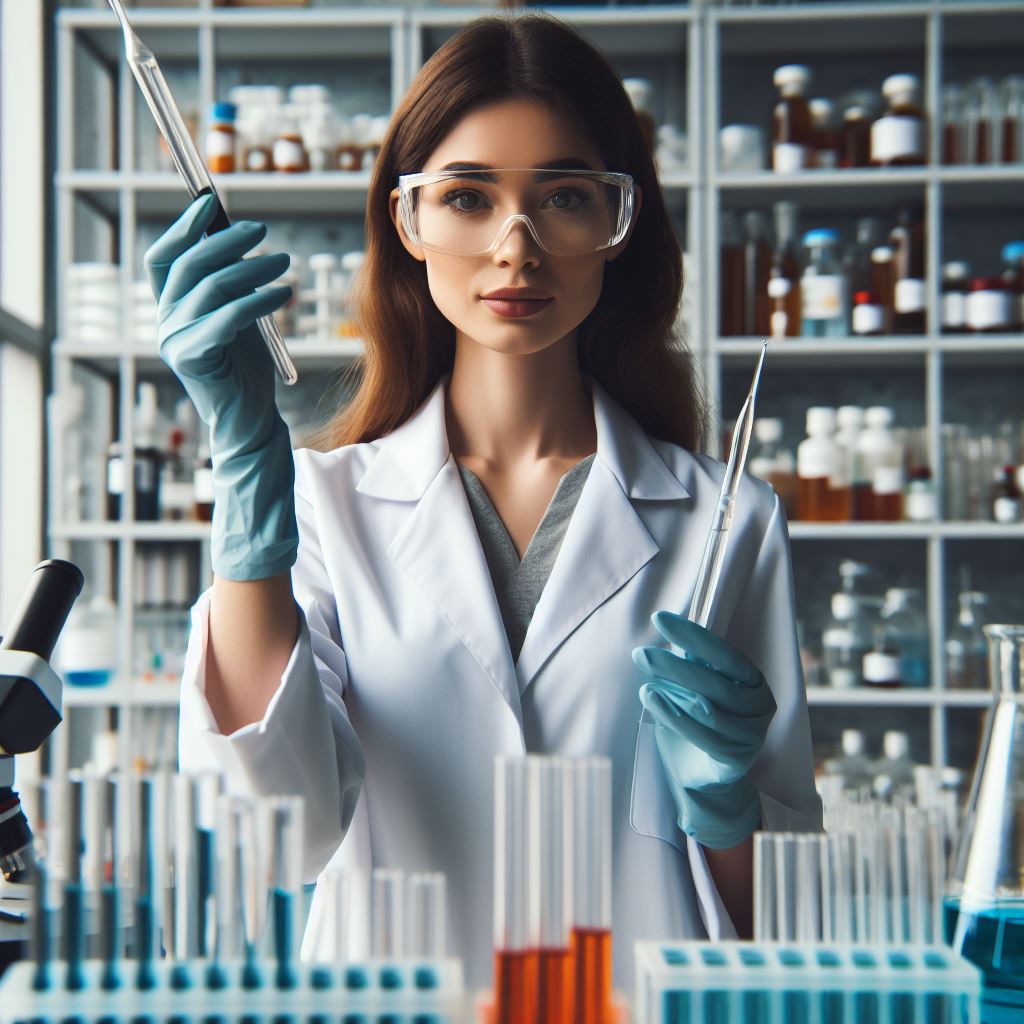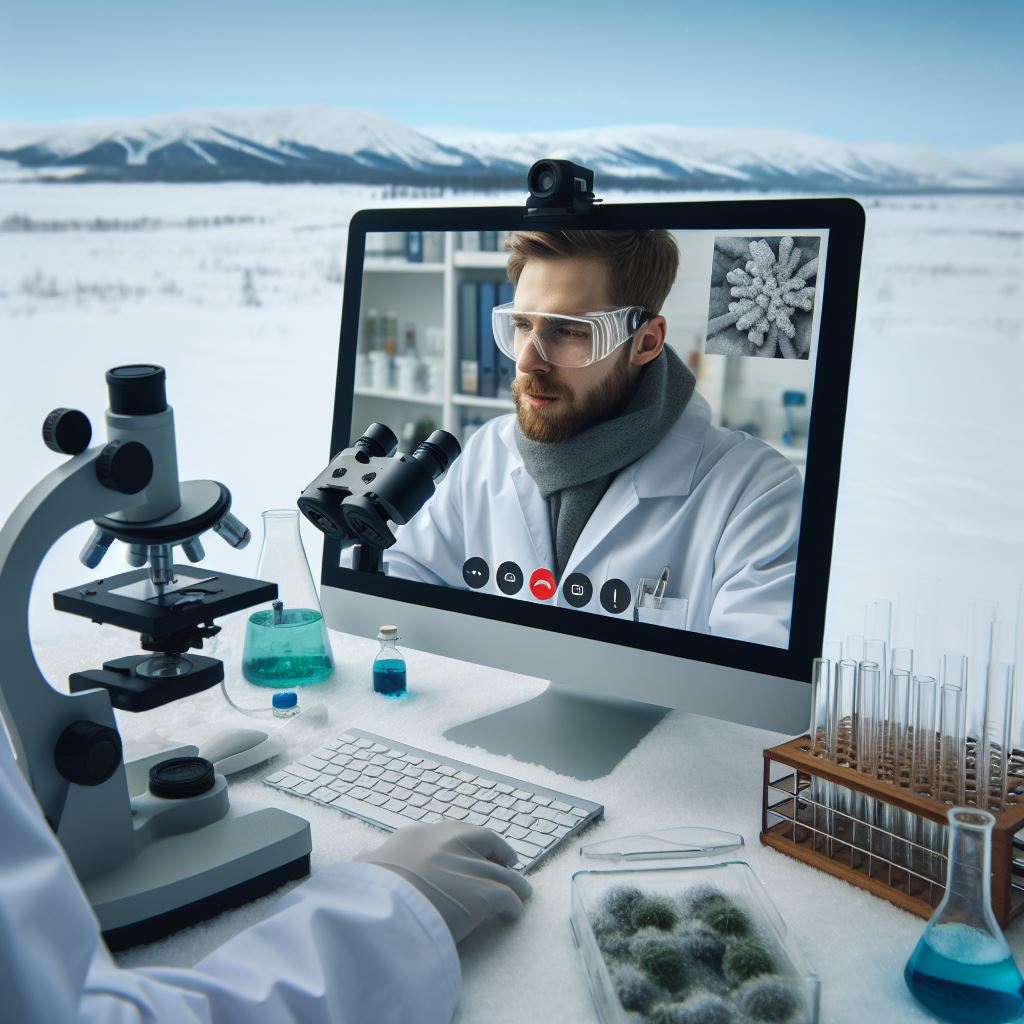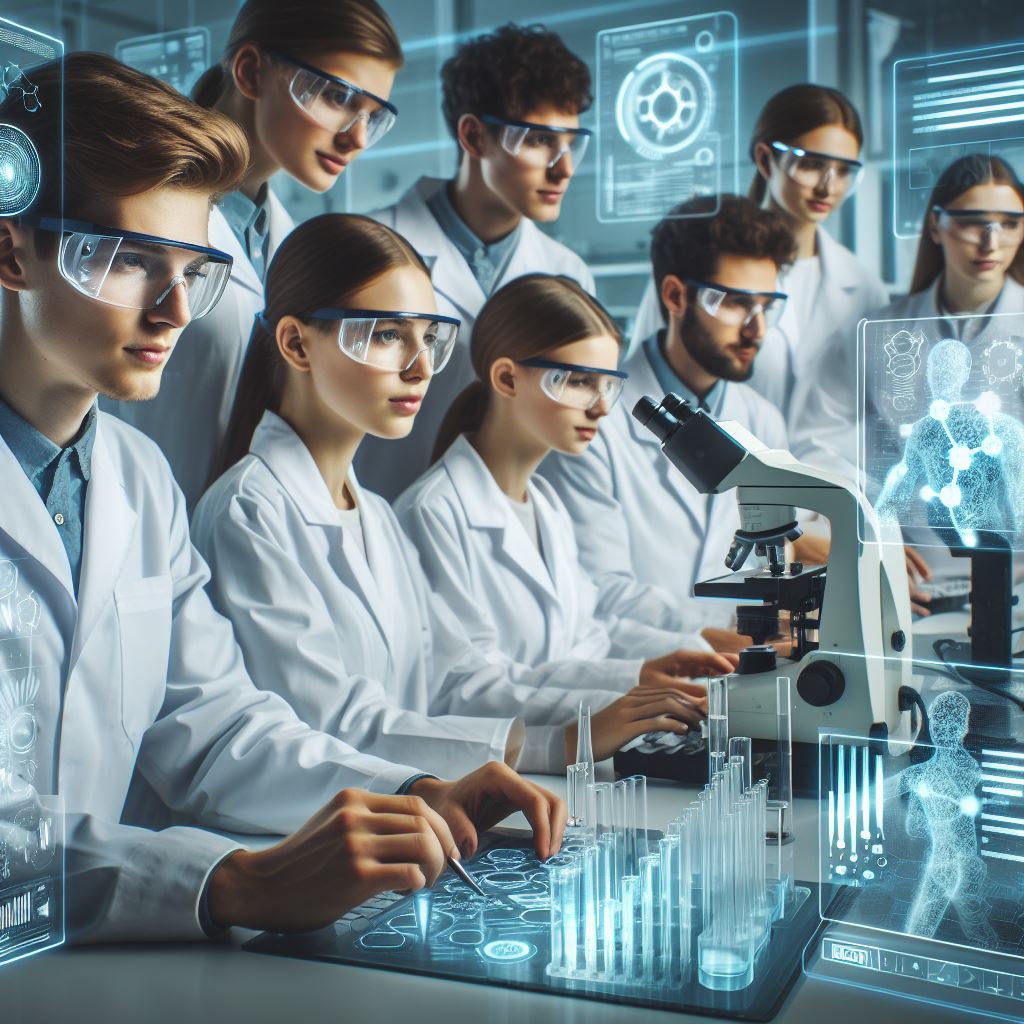Introduction
Lab equipment mastery is crucial for laboratory technicians.
Mastery of lab equipment is crucial for scientific advancements and reliable research outcomes. Precise handling of instruments ensures accurate data collection, minimizing experimental errors.
Researchers depend on well-trained professionals to operate sophisticated tools like spectrophotometers, chromatographs, and centrifuges, crucial for various analyses.
Proficiency in lab equipment usage enhances efficiency, expediting the research process and fostering innovation.
Moreover, it contributes to safety by preventing accidents and maintaining the integrity of experiments.
In both academic and industrial settings, mastering lab equipment is fundamental for scientists, technicians, and students, laying the foundation for groundbreaking discoveries and technological progress.
This guide will provide a brief overview of its importance and target audience.
Explanation of Lab Equipment
Definition and Types of Lab Equipment Commonly Used in Labs
- Pipettes: Used to accurately measure and transfer small amounts of liquid.
- Microscopes: Enable the observation of small objects or organisms at a high magnification.
- Bunsen Burner: Produces a controlled flame for heating substances.
- Centrifuge: Spins samples at high speeds to separate components based on their density.
- Hot Plate: Used for heating substances in glassware or on metal surfaces.
- Autoclave: Sterilizes equipment and materials using high-pressure steam.
- Incubator: Provides controlled temperature and humidity conditions for cell or bacterial growth.
- Fume Hood: Removes harmful fumes and chemicals from the laboratory workspace.
- Spectrophotometer: Measures the intensity of light absorbed or transmitted by a substance.
- Glassware (Erlenmeyer flasks, beakers, test tubes, etc.): Used for mixing, heating, and storing substances.
Importance of Understanding the Functions and Capabilities of Each Equipment
Safety
By understanding the functions and capabilities of lab equipment, technicians can conduct experiments safely and efficiently.
Safety is a top priority in any laboratory setting, and proper knowledge of equipment operation minimizes the risk of accidents and injuries.
Accurate measurements are essential for obtaining reliable results, and understanding the equipment used enables technicians to perform precise measurements.
Efficiency
Efficiency is also improved when technicians are familiar with lab equipment. They can work more efficiently, saving time and resources.
Additionally, troubleshooting becomes easier when one knows the capabilities of each equipment.
Technicians can identify potential issues or malfunctions and take appropriate actions to resolve them.
Understanding lab equipment is crucial for maintaining quality control in scientific experiments. Proper knowledge ensures the validity and reliability of the obtained results.
It also aids in experimental design, helping technicians choose the most suitable equipment for specific experiments.
Maintenance and Calibration
Regular maintenance and calibration of lab equipment are essential for accurate and consistent results.
Understanding the functions and capabilities of the equipment facilitates these maintenance procedures.
Technicians can ensure that the equipment is performing optimally, preventing potential instrument failures and inconsistencies in results.
Furthermore, mastering lab equipment fosters effective collaboration among colleagues.
Technicians can communicate more efficiently, share information about equipment usage, and troubleshoot together. This promotes a productive and positive work environment.
Finally, understanding lab equipment is a valuable skill for professional development.
Technicians who are knowledgeable in equipment operation have a competitive edge in the scientific field. This mastery opens up opportunities for career advancement and recognition in the research community.
Essentially, understanding the functions and capabilities of lab equipment is essential for technicians.
It improves safety, accuracy, efficiency, troubleshooting, quality control, experimental design, maintenance, resource management, collaboration, and professional development.
Mastering lab equipment allows technicians to excel in their work and contribute to scientific advancements.
Unlock Your Career Potential
Visualize a clear path to success with our tailored Career Consulting service. Personalized insights in just 1-3 days.
Get StartedImportance of Lab Equipment Mastery
In the laboratory, mastering lab equipment is essential for various reasons. Let’s explore its significance:
Ensuring accurate and reliable results
- Proper mastery of lab equipment ensures precise measurements and data collection.
- When technicians handle equipment correctly, it minimizes errors and improves the accuracy of experimental outcomes.
- Accurate results are crucial for scientific research, medical diagnostics, and quality control in industries.
Minimizing risks and maintaining a safe working environment
- Proficient use of lab equipment reduces the chances of accidents, hazards, and personal injuries.
- Technicians who understand the equipment’s safety protocols can prevent mishaps and protect
- Proper maintenance and calibration of lab equipment also play a vital role in ensuring a safe working environment.
Improving efficiency and productivity in the lab
- Mastery over lab equipment allows technicians to work efficiently and achieve better productivity.
- When technicians are familiar with the equipment’s features and functions, they can streamline processes and save time.
- Efficient utilization of lab equipment enables faster experimentation, analysis, and completion of tasks.
- Achieving higher productivity leads to increased output, reduced project duration, and cost-saving benefits.
To summarize, mastering lab equipment is of utmost importance for technicians, as it ensures accurate and reliable results, minimizes risks, and maintains a safe working environment.
Additionally, it improves efficiency and productivity, leading to enhanced outcomes within the laboratory setting.
Read: Top Canadian Chemists: Their Path and Impact
Steps to Achieve Lab Equipment Mastery
Study and familiarize yourself with the equipment manuals
One of the first steps in mastering lab equipment is to carefully study and familiarize yourself with the equipment manuals.
The manuals provide essential information about the equipment’s functionalities, safety precautions, and troubleshooting tips.
By understanding the manuals thoroughly, you can gain a solid foundation and develop a comprehensive understanding of the equipment.
Seek guidance from experienced colleagues or mentors
Another crucial step in achieving lab equipment mastery is seeking guidance from experienced colleagues or mentors.
These individuals have valuable hands-on experience and can provide valuable insights, tips, and tricks based on their expertise.
By tapping into their knowledge and learning from their experiences, you can accelerate your learning curve and avoid potential pitfalls.
Attend specialized training and workshops
To further enhance your lab equipment mastery, attending specialized training and workshops is highly recommended.
These training programs are designed to provide in-depth knowledge and practical skills specific to the equipment you are working with.
Through hands-on exercises, interactive sessions, and guidance from experts, you can gain advanced proficiency and confidence in using the equipment.
Practice hands-on with the equipment
One of the most effective ways to achieve lab equipment mastery is through hands-on practice.
Regularly dedicating time to practice using the equipment helps develop muscle memory and improves your familiarity and comfort level.
Experimenting with different settings, troubleshooting issues, and conducting tests will foster proficiency and agility in operating the equipment.
In fact, achieving lab equipment mastery requires a systematic approach that includes studying manuals, seeking guidance from experienced colleagues, attending specialized training, and practicing hands-on with the equipment.
By following these steps and continuously building your knowledge and skills, you can become a proficient and confident lab technician.
Read: Canadian Chemists and COVID-19: Pioneering Work

See Related Content: How Environmental Scientists Impact Policy
Tips for Effective Lab Equipment Mastery
Proper maintenance and calibration of equipment
- Regularly inspect and clean the lab equipment to ensure its proper functioning and longevity.
- Follow the manufacturer’s guidelines for calibration and perform it at recommended intervals.
- Document all maintenance and calibration activities to track any recurring issues and ensure compliance with regulations.
- Train lab technicians on equipment maintenance protocols to minimize downtime and maximize productivity.
- Maintain an inventory of spare parts and consumables to quickly address equipment failures and avoid delays in lab operations.
Regularly updating knowledge and skills through continuous education
- Stay abreast of the latest advancements and updates in lab equipment technology through industry publications and journals.
- Attend workshops, conferences, and seminars to enhance technical skills and gain insights from experts in the field.
- Participate in webinars and online courses to learn about new features, troubleshooting techniques, and best practices for equipment operation.
- Network with peers in the industry to exchange knowledge, experiences, and recommendations on lab equipment mastery.
- Encourage cross-training among lab technicians to ensure a diverse skill set and better coverage during absences or emergencies.
Developing troubleshooting skills for common equipment issues
- Familiarize yourself with the common problems that occur with lab equipment and their respective troubleshooting steps.
- Update troubleshooting manuals and quick reference guides for easy access and to reduce downtime during equipment failures.
- Develop a systematic approach to identify and resolve equipment issues, using logical reasoning and diagnostic tools.
- Seek guidance from experienced technicians or manufacturers’ technical support when encountering complex or unfamiliar problems.
- Document successful troubleshooting techniques for future reference and share them with the lab team to improve overall efficiency.
Utilizing online resources and communities for additional support
- Join online forums and communities specific to your field of expertise to connect with other lab technicians, engineers, and professionals.
- Engage in discussions and seek advice from experienced members regarding equipment mastery and problem-solving.
- Follow reputable websites and blogs that provide updates, tips, and best practices for lab equipment operation and maintenance.
- Utilize online tutorials, videos, and interactive platforms to enhance your understanding of specific equipment or techniques.
- Stay active on social media platforms relevant to the lab equipment industry, as they often share valuable insights and news.
Generally, effective lab equipment mastery requires proper maintenance, knowledge updates, troubleshooting skills, and utilizing online resources.
By investing time and effort in these areas, lab technicians can ensure the efficient and reliable functioning of equipment, leading to accurate results, improved productivity, and ultimately, better scientific outcomes.
Read: Day in the Life of a Canadian Research Chemist
Explore Further: Effective Networking Tips for Research Analysts
Learn More: Networking in the Environmental Science Field
Overview of Lab Equipment Mastery Challenges
Mastering lab equipment is essential for technicians who aim to excel in their profession. However, several challenges hinder their journey towards achieving equipment mastery.
High costs and limited access to specialized training
Firstly, the high costs associated with acquiring and maintaining specialized lab equipment can be a significant obstacle.
Lab equipment, especially cutting-edge technology, often comes with a hefty price tag. Moreover, the cost of regular maintenance, calibration, and repairs further adds financial strain.
As a result, many technicians face limited access to these resources.
High costs and limited access to specialized training
Secondly, lab technology is constantly evolving, presenting a challenge to technicians.
What may be considered state-of-the-art today might become outdated in a matter of months.
Thus, technicians must stay ahead of the curve to effectively operate and utilize the capabilities of modern lab equipment.
The complexity of the machinery itself adds to the challenge.
Lab instruments are becoming increasingly intricate, requiring specialized knowledge and skills to operate.
Technicians must grasp concepts such as data analysis, software integration, and automation, among others.
Finally, fear and lack of confidence can become substantial barriers to mastering lab equipment.
Technicians may feel apprehensive when faced with unfamiliar, advanced equipment.
They worry about making mistakes that could potentially lead to costly errors or compromise results.
Overcoming fear and building confidence in handling advanced equipment
Overcoming this fear is crucial to building confidence in handling and operating lab equipment.
Regular practice and exposure to different equipment can help technicians develop proficiency.
Guidance from experienced professionals and participation in hands-on training further enhances their confidence.
In general, the mastery of lab equipment presents various challenges for technicians.
These challenges include high costs, limited access to specialized training, evolving technology, and overcoming fear.
Despite these obstacles, technicians can succeed in mastering lab equipment through continuous learning, practice, and determination.
By investing in their skills and embracing new technologies, technicians can excel in their roles and contribute to scientific advancements.
Read: Canadian Biologists and Climate Change Research
Conclusion
To recap, lab equipment mastery is crucial for laboratory technicians as it ensures accurate and reliable results.
Mastery of lab equipment is paramount for laboratory technicians as it ensures accurate experimentation and reliable results.
Precise handling of instruments like pipettes, centrifuges, and spectrophotometers is essential to guarantee the integrity of scientific data.
Technicians must understand calibration, maintenance, and troubleshooting to uphold the equipment’s functionality.
Proficiency in using diverse apparatus enhances efficiency, reduces errors, and promotes safety in the laboratory environment.
Mastering lab equipment empowers technicians to contribute effectively to scientific research, healthcare diagnostics, and various industries dependent on accurate and reproducible experimental outcomes.
Continuous learning and development are essential in this field as technology advances and new equipment is introduced.
Technicians should strive for equipment mastery to enhance their skills, advance their careers, and contribute to the scientific community.
Take action today and become a master in lab equipment!




